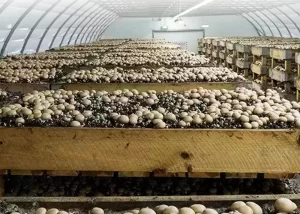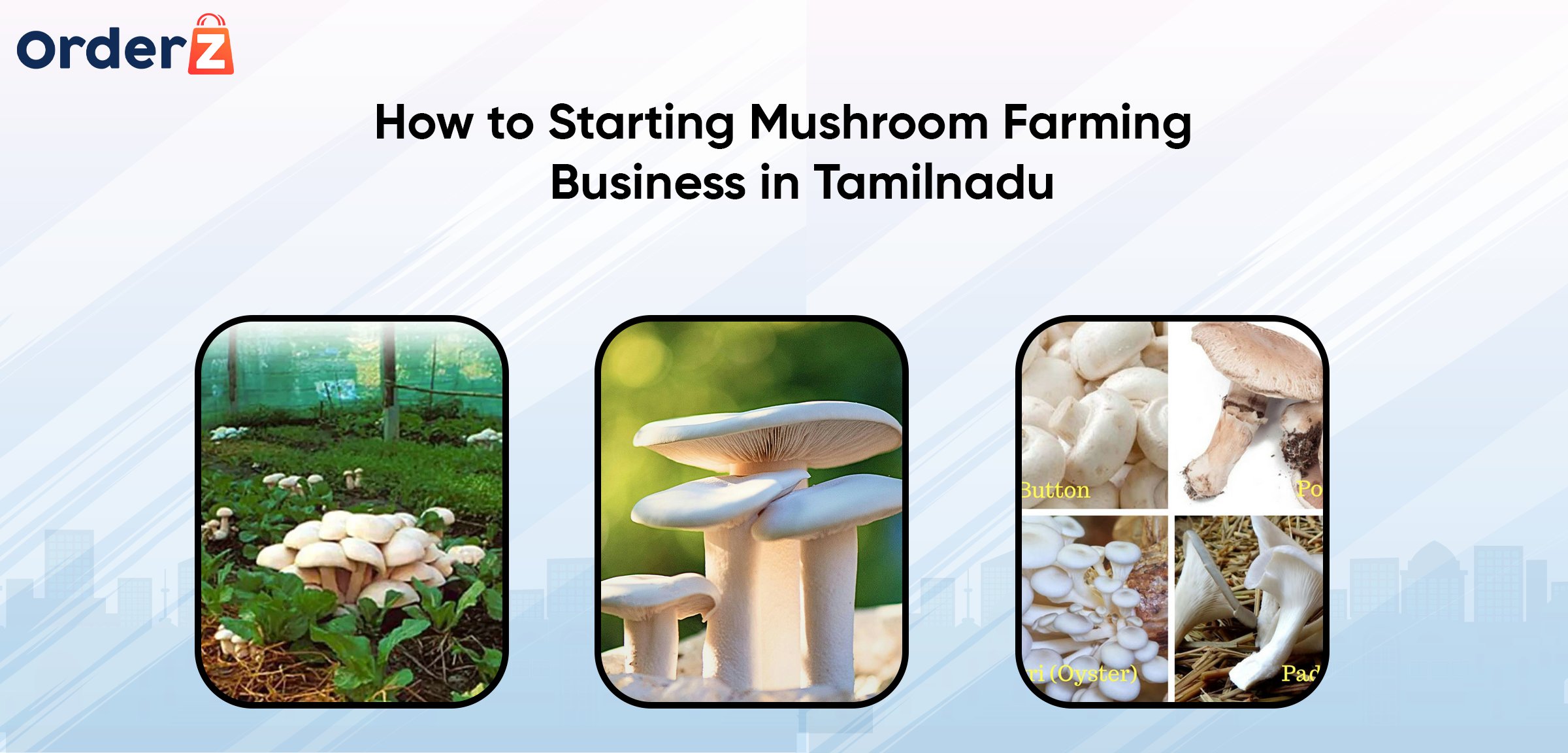Introduction
Mushroom farming is a rapidly growing agricultural sector in Tamil Nadu, offering a lucrative opportunity for entrepreneurs and farmers alike. The demand for fresh, locally produced mushrooms has been steadily increasing due to their nutritional value, versatility, and culinary appeal. With the right knowledge and planning, starting a mushroom farming business can be a profitable and rewarding venture.
Tamil Nadu, with its favorable climate and abundant agricultural resources, provides an ideal environment for mushroom cultivation. The state’s diverse geographical regions, ranging from coastal plains to hilly terrains, offer suitable conditions for growing various mushroom varieties. Additionally, the increasing awareness of health and wellness among consumers has fueled the demand for organic and locally sourced produce, including mushrooms.
This comprehensive guide will provide you with valuable insights into the process of starting a mushroom farming business in Tamil Nadu. It will cover essential topics such as selecting the right mushroom varieties, setting up a suitable growing environment, obtaining necessary licenses and permits, preparing growing media, inoculating the spawn, maintaining optimal growing conditions, harvesting and selling mushrooms, and addressing common challenges.
By following the steps outlined in this guide, you can establish a successful mushroom farming business and contribute to the region’s agricultural economy while enjoying the benefits of a sustainable and profitable venture.
What is a Mushroom?

A mushroom is the fruiting body of a fungus. It’s the part we see above the ground. The rest of the fungus, called mycelium, is a network of tiny filaments that grows underground or within its food source.
Mushrooms are typically composed of a cap and a stem. The cap contains the spores, which are the reproductive units of the fungus. When the spores land in a suitable environment, they can germinate and grow into new fungi.
Mushrooms come in a wide variety of shapes, sizes, and colors. Some are edible, while others are poisonous. Some mushrooms are cultivated for food, while others grow wild in forests and meadows.
Demand and Market for Mushrooms in Tamil Nadu

Mushrooms have gained significant popularity in recent years due to their nutritional value, versatility, and unique flavors. This has led to a growing demand for mushrooms in Tamil Nadu and across India.
Factors Driving Demand:
- Health Benefits: Mushrooms are rich in vitamins, minerals, and antioxidants. They are also a good source of protein and fiber, making them a popular choice among health-conscious consumers.
- Culinary Versatility: Mushrooms can be used in a wide variety of dishes, from soups and stews to salads and stir-fries. Their unique flavors and textures add depth and complexity to any meal.
- Increasing Awareness: As consumers become more aware of the benefits of mushrooms, demand has been steadily increasing.
- Export Opportunities: There is a growing demand for Indian mushrooms in international markets, especially in countries with a large Asian diaspora.
Market Trends and Opportunities:
- Organic Mushrooms: There is a growing preference for organic mushrooms, driven by the increasing awareness of sustainable agriculture and food safety.
- Specialty Mushrooms: Exotic and specialty mushrooms, such as shiitake, oyster, and cremini, are gaining popularity among discerning consumers.
- Value-Added Products: Mushroom-based products, such as mushroom powder, extracts, and ready-to-eat meals, are emerging as new market opportunities.
- Online Sales: E-commerce platforms have made it easier for mushroom producers to reach a wider customer base, including consumers in remote areas.
Challenges and Opportunities:

- Seasonal Fluctuations: The production of mushrooms can be affected by seasonal factors, leading to fluctuations in supply and demand.
- Competition: The market for mushrooms is becoming increasingly competitive, with more players entering the industry.
- Infrastructure: The lack of adequate infrastructure, such as cold storage facilities and transportation networks, can pose challenges for mushroom producers.
- Price Sensitivity: Consumers are often price-sensitive when it comes to mushrooms, making it essential for producers to offer competitive prices.
Despite these challenges, the market for mushrooms in Tamil Nadu is expected to continue growing. By understanding the factors driving demand and adapting to market trends, mushroom producers can capitalize on the opportunities and establish a successful business.
Why Mushroom Farming Business?

Mushroom farming presents a compelling opportunity for entrepreneurs seeking a profitable and sustainable business venture. The growing demand for mushrooms, driven by their nutritional value, versatility, and culinary appeal, has created a favorable market environment.
One of the key advantages of mushroom farming is its high profit potential. With a relatively low investment, farmers can achieve a significant return on investment due to the short cultivation cycle and the high value of mushrooms in the market. Moreover, the increasing preference for organic and locally sourced produce has further boosted the demand for mushrooms, offering farmers the opportunity to premiumize their products.
Another attractive aspect of mushroom farming is its sustainability. Mushrooms can be cultivated using organic methods, minimizing the environmental impact and promoting sustainable agriculture. Additionally, mushroom cultivation can contribute to reducing food waste by utilizing byproducts from other agricultural industries, such as rice straw and cotton waste.
Furthermore, mushroom farming offers flexibility and scalability. It can be started on a small scale and gradually expanded as demand grows, making it accessible to both experienced farmers and aspiring entrepreneurs. Additionally, mushrooms can be cultivated in various settings, including indoor spaces, greenhouses, or even outdoor areas, providing flexibility in terms of location and resources.
Types of Mushrooms

Mushrooms come in a vast variety, each with unique characteristics, flavors, and nutritional profiles. Here are some of the most common types:
Edible Mushrooms:

- Button Mushrooms: The most common type, known for their mild flavor and versatility.
- Shiitake Mushrooms: Have a distinctive earthy flavor and are often used in Asian cuisine.
- Oyster Mushrooms: Known for their fan-shaped caps and delicate flavor.
- Cremini Mushrooms: Also known as baby portobello mushrooms, they have a stronger flavor than button mushrooms.
- Portobello Mushrooms: Large, meaty mushrooms with a rich, earthy flavor.
- King Oyster Mushrooms: Have a firm texture and a mild, nutty flavor.
- Reishi Mushrooms: Often used in traditional Chinese medicine for their medicinal properties.
- Lion’s Mane Mushrooms: Known for their unique appearance and potential health benefits.
- Morel Mushrooms: Delicate, honeycomb-shaped mushrooms with a nutty flavor.
Medicinal Mushrooms:

- Cordyceps Mushrooms: Used in traditional Chinese medicine for various health benefits.
- Chaga Mushrooms: Known for their antioxidant properties and potential benefits for immune health.
- Turkey Tail Mushrooms: Used for their immune-boosting properties.
- Maitake Mushrooms: Believed to have anti-cancer and blood sugar-regulating properties.
Poisonous Mushrooms:

Death Cap Mushrooms: One of the deadliest mushrooms, containing toxins that can cause liver failure.
- Amanita Mushrooms: Many species are poisonous, including the death cap and destroying angel.
- Galerina Mushrooms: Contain toxins similar to those found in death cap mushrooms.
- It’s important to note that only experienced mycologists should identify and consume wild mushrooms. Misidentification can lead to serious illness or death. For beginners, it’s safer to purchase mushrooms from reputable sources.
Different License Requirements for the Business

The specific license requirements for a mushroom farming business in Tamil Nadu may vary depending on the scale of the operation and local regulations. However, common requirements may include:
- Agricultural Land Use Permit: If you are using agricultural land for mushroom farming, you may need to obtain a permit from the local agricultural department.
- Food Safety Certification: To ensure the safety and quality of your mushroom products, you may need to obtain a food safety certification from a recognized authority.
- Business License: If you are operating as a business entity, you will need to obtain a business license from the local municipality or state government.
- Environmental Clearance: Depending on the scale of your operation and its impact on the environment, you may need to obtain environmental clearance from the relevant government agencies.
- GST Registration: If your business exceeds the threshold limit for GST registration, you will need to register for GST.
It’s essential to consult with local authorities and experts to determine the specific license requirements for your mushroom farming business in Tamil Nadu.
Mushroom Yields in Tamil Nadu

Mushroom yields in Tamil Nadu can vary depending on factors such as the mushroom variety, growing conditions, cultivation practices, and the scale of the operation. However, with proper management, you can expect reasonable yields.
Here are some estimated yields for popular mushroom varieties:
- Oyster Mushrooms: 2-3 kg per square meter per flush
- Shiitake Mushrooms: 1-2 kg per square meter per flush
- Button Mushrooms: 1-1.5 kg per square meter per flush
The number of flushes (harvest cycles) per year can also influence the overall yield. Factors such as temperature, humidity, and substrate quality can affect the number of flushes.
Cost and Profit Analysis of Mushroom

The cost and profit analysis of a mushroom farming business will depend on several factors, including:
- Initial Investment: This includes the cost of land, infrastructure, equipment, growing media, spawn, and other inputs.
- Recurring Costs: These include the cost of labor, utilities, maintenance, and packaging.
- Revenue: The revenue generated from selling mushrooms will depend on the market price and the quantity produced.
- Profit: The profit margin will depend on the difference between revenue and costs.
It’s essential to conduct a thorough cost-benefit analysis to assess the financial viability of your mushroom farming business in Tamil Nadu. This will help you make informed decisions about the scale of your operation, pricing strategies, and risk management.
Conclusion
Starting a mushroom farming business in Tamil Nadu presents a promising opportunity for entrepreneurs seeking a profitable and sustainable venture. By understanding the market dynamics, selecting the right mushroom varieties, setting up a suitable growing environment, and adhering to regulatory requirements, you can establish a successful business.
Remember to conduct thorough market research, develop a comprehensive business plan, and invest in quality equipment and inputs. With careful planning and execution, you can contribute to the growing demand for fresh, locally produced mushrooms in Tamil Nadu and enjoy the rewards of a successful agricultural enterprise.
To streamline your business operations and expand your reach, consider using an eCommerce platform like OrderZ. It’s offers a user-friendly interface, powerful features, and affordable pricing to help you create a professional online store and sell your mushrooms directly to customers.
By leveraging OrderZ, you can:
- Create a visually appealing and functional online store without any coding knowledge.
- Efficiently manage your products, inventory, and orders.
- Accept payments from customers through various gateways.
- Utilize marketing tools to reach a wider audience.
- Provide excellent customer service and support.
- Gain valuable insights into your store’s performance.
OrderZ can help you take your mushroom farming business to the next level by providing a convenient and effective platform for selling your products online.
FAQs
- What are the ideal climatic conditions for mushroom cultivation in Tamil Nadu?
While Tamil Nadu offers diverse climatic conditions, the coastal regions and hilly areas are generally considered more suitable for mushroom farming. These regions provide adequate humidity, temperature, and rainfall for optimal growth. However, with proper environmental control techniques, mushrooms can also be cultivated in other areas of the state.
- What is the initial investment required to start a mushroom farming business in Tamil Nadu?
The initial investment for a mushroom farming business in Tamil Nadu can vary significantly depending on the scale of the operation, the type of mushrooms cultivated, and the infrastructure required. Factors such as land, building, equipment, growing media, spawn, and labor costs will contribute to the overall investment. It is essential to conduct a detailed cost-benefit analysis to estimate the initial investment and assess the potential profitability of the venture.
- How long does it take to start seeing a return on investment?
The time varies depending on factors like mushroom variety, growing conditions, market demand, and operational efficiency. Generally, mushrooms have a shorter growth cycle compared to other crops, but factors like market fluctuations and initial setup costs can influence the time to break even.
- What are the challenges and risks associated with mushroom farming?
Challenges include market fluctuations, pests and diseases, competition, and environmental factors.
- What are the potential benefits of mushroom farming in Tamil Nadu?
Benefits include high profit potential, sustainability, job creation, food security, and export opportunities.



